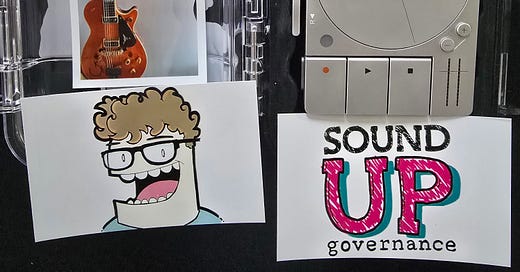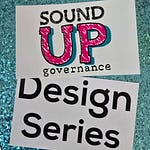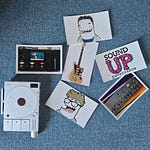TRANSCRIPT
MATT VOICEOVER
Welcome back to Sound-Up Governance. My name is Matt Fullbrook. Once again, our guest is my great friend Andrew Escobar, corporate director, open finance advocate, and big thinker. In today's episode, we discuss what it takes for a director to feel empowered to be great and whether it might be a good thing for boards to be friends. Let's dive in.
MATT
What might it look like to empower any person, a person in the room, to behave like a great director instead of a not-so-great director?
ANDREW ESCOBAR
That's a really tough question. I'm trying to think of. I'm trying to think of not-so-great directors who maybe turned out to be great directors.
MATT
What could others do to make you feel more empowered, to feel like you can be curious and express that curiosity?
ANDREW ESCOBAR
Maybe I don't have another way to phrase this because I'm going back to my previous comment. Sometimes you need to be a really great editor, and sometimes you need a great editor. That, alone, I might come to a decision with all sorts of questions, but I need either a board, a system, a chair who can be a great editor for me. I think that's a, I'd say the fundamental role of a board chair, committee chair, to be a great editor. It's to curate those questions because you're not going to get maybe all the answers. And what is fundamentally the top question that we want answered? And that actually might not resolve within a regular meeting cadence. It might take us a few years to resolve. I know that I always approach board work with a ton of questions that don't go answered. I try to be my own editor, but it's almost so much more useful to rely on others to be your editor. And I think when I think of ok directors that turn out to be great directors, they found a way to be more open with their questions outside of meetings, outside of the regular structure of a board. And that's where, like, the magic happens. That's where the great questions are formulated, not always inside a board meeting.
MATT
It's occurring to me. One of the things that - this is unrelated to the actual questions here, but I think it's still worth talking about - one of the things that happened early in my career in the governance space was there was this anxiety around friendship. I'm generalizing, but we don't want directors to be pals. There's this fear that's an independence problem. If people care about each other as human beings, then they're gonna make decisions that are in each other's interests instead of whatever. And I think, first of all, I think that we corrected way too hard on that, and it introduced a level of formality to the world of boards that really worked against what you're talking about. But to what extent do you need to invest in building relationships to get this vibe that you're describing?
ANDREW ESCOBAR
Building relationships at work or on a board is not the same thing as building friendships. Those are different things. But I don't see how you can really do great work without great relationships. If that's true... If that's true, 9 to 5, Monday to Friday in your standard work hours, what would make board work or board relationships any different? There is something fundamentally different about a board who is teaming and a team who sees each other on a daily or regular basis. But I don't think that I could be a great director without having great relationships on that board. It would be... I think it's impossible. I really do. Because then what you're doing is you're approaching the problem of governance singularly. It's just you. I'm here to figure out what conditions work for me. I'm here to get answers on what I think is important for this organization, not what you as a board believe are the right questions, the right decisions. The right conditions. Like that is something collective. I don't. How do you do something collective without strong relationships? Do friendships get in the way of that? Maybe. But, I mean, I can sit down with a friend who I've known for a year or 10 years and get into a great debate, even a heated one, and still leave at the end of the night really enjoying their company and enjoying the conversation. Why wouldn't that also be true of board work?
MATT
Yeah, it's interesting. I think there's this, like, misconception, and maybe this is true for a lot of people, because the range of personalities among humankind is pretty vast. But I think we kind of imagine that with friends, it's harder to engage in conflict or call people out or escape groupthink or whatever. And I think for a lot of that range of personalities, it's actually the opposite, where the comfort level goes up to say, "no, that's stupid." Or, "you know, I don't. I really think this might be a bad idea." Or, "that really pissed me off, what you just did." Or whatever. Compared to, say, confronting a stranger like that.
MATT VOICEOVER
What do you think? Board chairs as compassionate editors, Boards as caring friends. I love these ideas, and I think they can help to turn big, complex and technical boardroom concepts and make them a bit more tangible and doable. Thanks for listening. In the next episode, Andrew and I will talk through how a board can consider the interests of all its key stakeholders in a really short time. For notes on today's music, scroll down to the bottom of the episode post at groundupgovernance.com See you next time.
MUSIC NOTES
Ever heard of “finger drumming”? Instead of me describing it, just look it up on YouTube and you’ll understand right away. For this tune I “finger drummed” on my MPC Live instead of programming a beat because I played the guitar part in the air instead of to a click/metronome. Anyway, this one’s just a simple bluesy guitar/bass/drums thing that emerged from the visceral joy of just playing an open E chord. All you guitarists out there know what I’m talking about. I used my Gretsch 6130 “Roundup” and for bass I used my Ernie Ball/Music Man Stingray 5. It was all recorded on the Teenage Engineering TP-7, which is a life-saver for someone like me who does multitrack recording while traveling.
Side note on the Roundup guitar - I’ve wanted one of these since I was a teenager. The whole over the top cowboy vibe appeals perfectly to my sense of kitsch and style. Mine was made in 2008 but I found it a couple years ago. It was the first one I’d ever seen in person. Love at first sight/sound.













Share this post